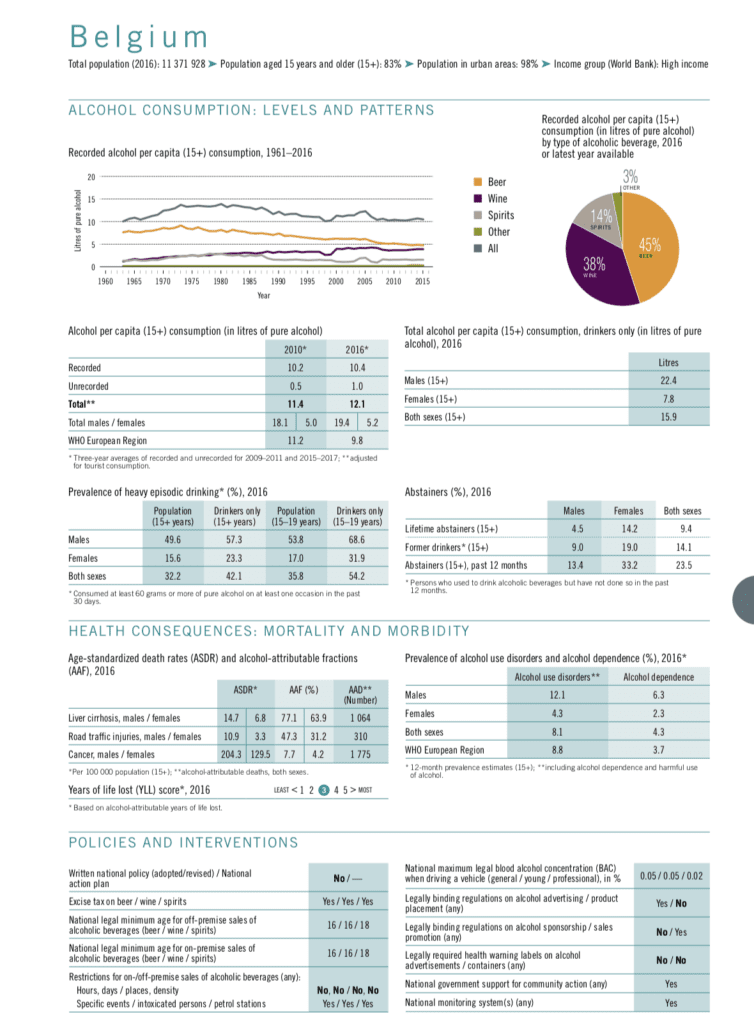The Federal government of Belgium has agreed on a new Alcohol Action Plan. The proposed plan is set to be approved at the inter-ministerial conference with the state governments in December 2022.
The federal government is already clear: we want to do everything we can to further limit [heavy/at-risk] use of alcohol, both from the point of view of public health and road safety,” said Frank Vandenbroucke, Minister of Health in Belgium, as per De Morgen.
Frank Vandenbroucke, Minister of Health, Belgium
The plan focuses on young people. According to Minister of Health Vandenbroucke, this is because young people suffer the most harm from the products and practices of the alcohol industry.
However, Belgian experts on the subject of alcohol policy are disappointed with the proposed measures because many of the important points have been watered down. They suspect strong interference from the alcohol lobby.
The plan proposes the following measures:
- A ban on alcohol advertising on television, cinemas, social media, newspapers, and magazines that has an audience of mainly minors (below 18 years of age).
- Age limit of 18 years for consumption of fortified beers and wines.
- This includes products such as Desperados which is a beer with tequila that has a 5.9% alcohol content.
- A care pathway for young people who may be experiencing an alcohol use problem.
- Young people who are hospitalized with alcohol intoxication, or after an alcohol-related traffic accident will be offered this pathway.
- No alcohol sales between 10:00 PM – 7:00 AM (overnight) in shops along the highway, for example at gas stations.
- No sale of chilled alcohol products in hospitals through vending machines and shops.
Alcohol lobby at work
The proposed measures are a heavily watered-down form of what has been recommended to the government by alcohol policy and public health experts and community organizations.
For example,
- Shops along the highway can still sell alcohol between 7:00 AM to 10:00 PM.
- Alcohol products that are at room temperature are still allowed to be sold at hospitals.
- Beer and wine products are still available in hospital cafeterias.
We have given clear advice to the government several times, but only find it in a strongly watered-down form in this. They hardly touch on the most important points, namely advertising, availability, and price,” said Katleen Peleman, director of the Flemish expertise center for alcohol and other drugs (VAD), as per De Morgen.
Katleen Peleman, director, Flemish expertise center for alcohol and other drugs (VAD)
The government focuses very much on young people and on ‘harmful’ alcohol consumption. But any form of alcohol consumption can have serious consequences for everyone,” said Professor Frieda Matthys from the Vrije Universiteit Brussel, as per De Morgen.
As always, these proposals have been strongly influenced by the alcohol lobby, which is supposedly constructive but only proposes measures that have no effect on their sales.”
Professor Frieda Matthys, Vrije Universiteit Brussels
Both experts say that only a complete advertising ban, an age limit of 18 for all alcohol products, and a permanent ban on the sale of alcohol along the highway and in hospitals can have a significant impact.
Alcohol policy and harm in Belgium
The World Health Organization (WHO) reports that in 2016 Belgium had a total alcohol per capita consumption of 12.1 liters. This is above the average for the WHO European region – the heaviest alcohol consuming region in the world.
Male consumption is specifically high at 22.4 liters per capita (alcohol users only). Binge alcohol use is high among alcohol-using youth between 15 to 19 years with over half (54.2%) engaging in this particularly harmful behavior.
The resulting alcohol harm is rampant in Belgium.
- 12.1% of Belgian males suffer from alcohol use disorder and 6.3% are dependent on alcohol.
- Every year alcohol causes,
- more than 1000 deaths from liver cirrhosis,
- over 300 deaths from road traffic injuries, and
- over 1500 deaths from cancer.
Despite this heavy alcohol burden, Belgium is yet to adopt a comprehensive alcohol control policy.
Furthermore, the alcohol industry is still “voluntarily self-regulating” alcohol advertising and failing to protect children and young people from alcohol harm in Belgium.
The Belgian government can better protect the people and communities by implementing evidence-based, high-impact policy solutions, such as the measures recommended by the World Health Organization in the SAFER Initiative and the alcohol policy best buys.
The three alcohol policy best buys are:
- Restricting the availability of alcohol products.
- Reducing the affordability of alcohol products through pricing measures such as taxation.
- Banning alcohol advertising.
Sources
De Morgen: “Federal government puts alcohol plan on the table: ‘As always heavily influenced by the alcohol lobby’“
Nieuwsblad: “Government wants to dampen alcohol consumption of young people with partial advertising ban“
STAP: “Belgian federal government reaches agreement on Alcohol Plan“

